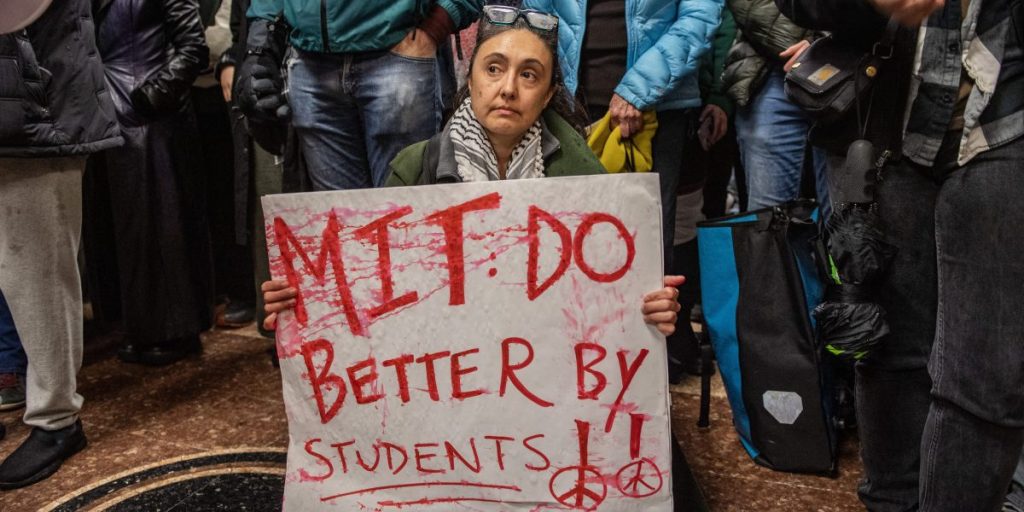Pro-Palestine student activists across the country have struggled to get their universities to respond to pressure for divestment from Israel and its military–industrial complex.
So when a professor at the Massachusetts Institute of Technology withdrew from a grant from the Israeli military after hearing feedback from students protesting the ongoing genocide in Gaza, it was especially welcome news.
“This is one of the only cases where we know that student activism and public pressure led directly to an Israeli tie being cut, let alone a collaboration with its genocidal military,” said Mila Halgren, a postdoctoral associate at MIT. (The university did not respond to a request for comment.)
“Student action is not meaningless.”
MIT has come under internal and public scrutiny for conducting research on warfare technology sponsored by Israel. In July, the United Nations condemned the school for conducting “weapons and surveillance research funded by the Israeli ministry of defense — the only foreign military financing research at the institute.”
That research included projects on drone swarm control — technology which the Israeli military has used during its siege on Gaza — pursuit algorithms, and underwater surveillance.
Markus Buehler, a professor in the civil engineering department, withdrew the grant earlier this summer shortly after a student pro-Palestine group publicized it on Instagram.
“This concession shows that student campaigns do have an influence,” Halgren said. “It also shows that these ties cannot survive transparency and public awareness. Student action is not meaningless; despite increased repression, it is more important than ever to resist genocide.”
Obscuring the Money Trail
MIT has said its proposals are not confidential and that it does not allow funders to make them secret. As students have drawn public attention to the school’s history of developing war technology for Israel, however, the school has made that information opaque, Halgren said.
Students used the school’s internal grant database to identify new contracts with the Israeli Ministry of Defense earlier this year and published a report on more than $3.7 million the Israeli military spent on warfare and surveillance research. (The U.N. mentioned several of those projects in its report this summer criticizing MIT for conducting Israeli military research during the ongoing genocide.)
After the student report was published, the school added new restrictions on access to the data, The Intercept previously reported.
In July, students found a loophole and identified more contracts sponsored by the Israeli military, including Buehler’s. The school responded by adding further restrictions to the database and a warning that unauthorized access could result in disciplinary action. Last month, school police issued a criminal trespass order to a lecturer and former student, citing unauthorized data access in July and August.
“There are now no sources for MIT community members to see who funds our school’s research.”
The school also stopped publicizing its research sponsors earlier this year. MIT took down its “Brown Book,” which documented its sponsored research, and said it would not publish them going forward. At the time, an MIT spokesperson said the school removed the reports to bring its financial reporting practices in line with federal requirements and “typical” disclosures, MIT’s student newspaper The Tech reported.
“Due to making these Israeli military ties public, MIT has removed access to both of its grant databases,” Halgren said. “There are now no sources for MIT community members to see who funds our school’s research.”
MIT students protesting genocide in Gaza have been calling on the school to drop research funded by the Israeli military since campus protests last spring.
MIT President Sally Kornbluth said in a July statement that school researchers working on projects funded by the Israeli military had faced “willful mischaracterizations” of their work. In a statement defending a professor named in the report as conducting Israeli-funded defense and surveillance research, Kornbluth wrote that suggestions that their research was designed for conflict were “untrue.”
While MIT has cut ties with other countries where partnerships raised concerns about human rights, the school has said it has “compelling reasons” not to cut ties with the Israeli military.
“One contract is down, but we won’t stop until MIT announces a full research stoppage for the Israeli military,” Halgren said. “As a military science school, MIT students and staff have a unique responsibility to stand up to the U.S.–Israeli war machine and prevent more horrifying violence in Palestine.”


